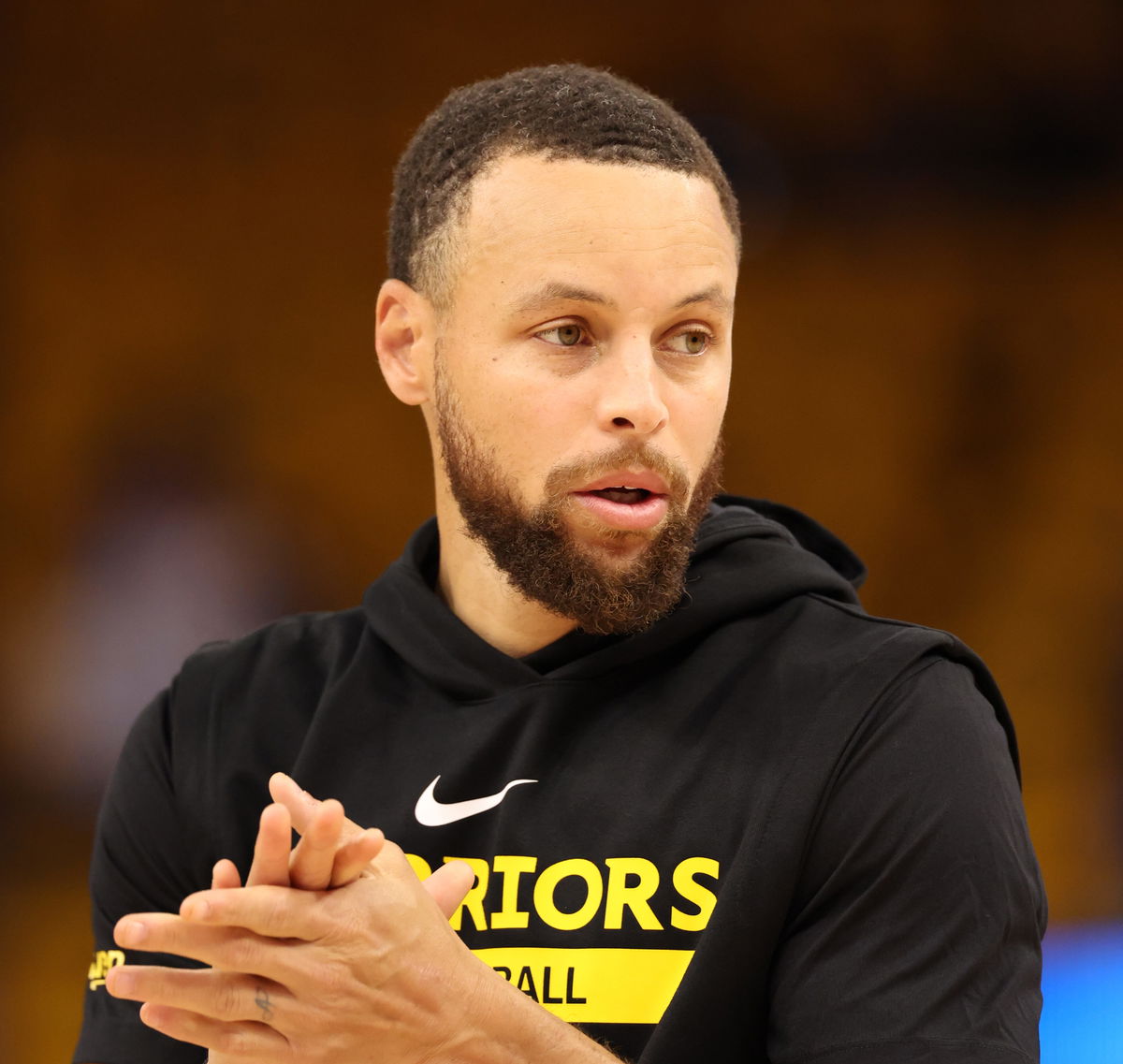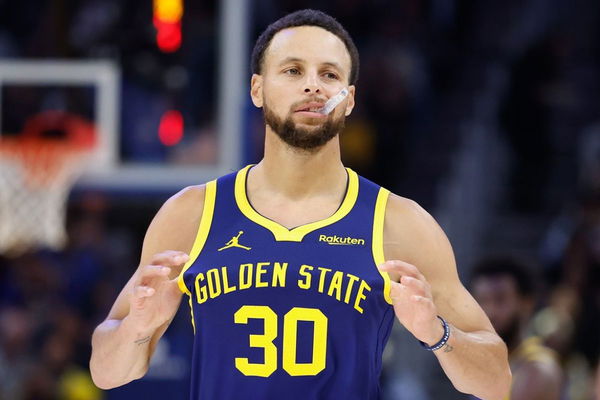
Imago
Apr 28, 2025; San Francisco, California, USA; Golden State Warriors guard Stephen Curry (30) warms up before game four of the 2025 NBA Playoffs first round against the Houston Rockets at Chase Center. Mandatory Credit: Kelley L Cox-Imagn Images

Imago
Apr 28, 2025; San Francisco, California, USA; Golden State Warriors guard Stephen Curry (30) warms up before game four of the 2025 NBA Playoffs first round against the Houston Rockets at Chase Center. Mandatory Credit: Kelley L Cox-Imagn Images

Imago
Apr 28, 2025; San Francisco, California, USA; Golden State Warriors guard Stephen Curry (30) warms up before game four of the 2025 NBA Playoffs first round against the Houston Rockets at Chase Center. Mandatory Credit: Kelley L Cox-Imagn Images

Imago
Apr 28, 2025; San Francisco, California, USA; Golden State Warriors guard Stephen Curry (30) warms up before game four of the 2025 NBA Playoffs first round against the Houston Rockets at Chase Center. Mandatory Credit: Kelley L Cox-Imagn Images
Stephen Curry isn’t new to shaking things up, whether it’s pulling up from 30 feet or speaking his mind. But his recent comments on NBA salaries left more than a few jaws on the floor. In an interview with Complex’s 360 With Speedy, Curry, a four-time NBA champion and two-time MVP, made waves by stating, “We are underpaid.” His reasoning? Players don’t have the right to own equity in the franchises they help build while they’re still playing.
Watch What’s Trending Now!
On paper, it sounds like a fair point. Until you consider this: Curry is about to pocket $122 million over the next two seasons. That will mark ten straight years as the highest-paid player in the league. And that’s where the questions about self-awareness begin. Rob Parker, co-host of The Odd Couple podcast, touched on something many fans were already thinking. Parker questioned the appropriateness of Curry’s public comments about NBA players being “underpaid,” especially given his own financial standing in the league.
Curry has been the NBA’s highest-paid player for nearly a decade. He’s made hundreds of millions in salary alone, not to mention his lucrative endorsement deals with brands like Under Armour, Chase, and CarMax. By the time his current extension ends in 2027, he will have earned well over $500 million just from NBA contracts. So when Curry, who lives in multi-million-dollar homes and vacations in private luxury, says he’s underpaid, it strikes many people, like Parker as tone-deaf.
“I just feel like Steph needs to be a little more self-aware when he says something like this publicly… about the fact that Steph, when his next contract is up… will have been the highest-paid player in the NBA for 10 straight years.”
Parker isn’t denying Curry’s impact on the game or the Warriors’ $9.4 billion valuation. He even acknowledges that Curry may be largely responsible for that growth. But his argument is clear, the idea of being underpaid loses traction when you’re making $60 million per year to play basketball.
Parker continued, “It’s not like you are, you know, nickel and diming, struggling your way through on a day-to-day basis. It’s not like you don’t live in a ridiculous mansion and probably got three more you’ve never even seen before.”His comments reflect a broader frustration. It’s not about whether Curry deserves his money, it’s about optics. Publicly lamenting financial limitations while enjoying generational wealth can feel out of touch to everyday fans who struggle to make ends meet.
However, it’s important to understand that Curry isn’t asking for a bigger salary or more contract money. Instead, he’s addressing a different issue, one built into the NBA’s Collective Bargaining Agreement (CBA). Right now, active players like Curry aren’t allowed to own part of the teams they play for. They can earn big paychecks, but they can’t share in the long-term ownership profits or equity that team owners enjoy. So, while Parker’s point about Curry’s wealth and lifestyle is valid, Curry’s real argument is about changing the system to allow players to participate in ownership and equity, which is currently prohibited.
Stephen Curry demands equity from $9.4B franchise
Stephen Curry is advocating for a deeper financial partnership between players and the league. His point is that while players are the driving force behind ticket sales, merchandise, global popularity, and skyrocketing franchise valuations, they’re only benefiting from that value in the short term, through their salaries and bonuses. Curry told Speedy Morman that players should be allowed to share the upsides of the game, through equity while they are still playing.
Curry’s not saying he wants more money in the form of a contract; he’s saying he wants the opportunity to invest in the league’s future success, just like the people who profit the most from it. He continues, “Those numbers sound crazy, but what the league is doing from whatever era you want to compare it to, to now is probably 10x that… the idea that we can’t participate in equity while we’re playing is a part of why I would say yes, we are underpaid.”
Steph believes players should have the opportunity to own stakes in their teams while still active. The same kind owners get while watching from a suite. And it’s not a baseless argument. Franchise valuations are skyrocketing. The Warriors are now worth $9.4 billion. The Lakers just sold for $10 billion. The Celtics changed hands for $6.1 billion. It’s a league-wide gold rush, and the players are holding pickaxes, not ownership shares.
Shai Gilgeous-Alexander and Devin Booker just inked extensions that will pay each of them $75 million in a single season. Santi Aldama is earning NFL-tier money at $18 million per year. The average NBA salary for 2024-25 was nearly $12 million. That dwarfs the NFL’s $3 million average. Although the NBA rosters are smaller, and the league is a global entertainment product. But still, for fans hearing that athletes earning more than $50 million a year feel underpaid, the reaction isn’t sympathy.
Curry tried to clarify his stance by adding, “I know we’re blessed… I think it’s all deserved… but yeah, I feel like hopefully sooner than later those rules change so that players can participate more in the upside of team equity… just ’cause I think we deserve it.” He’s not ungrateful, just ambitious. But the gap between ambition and self-awareness has never felt wider.

